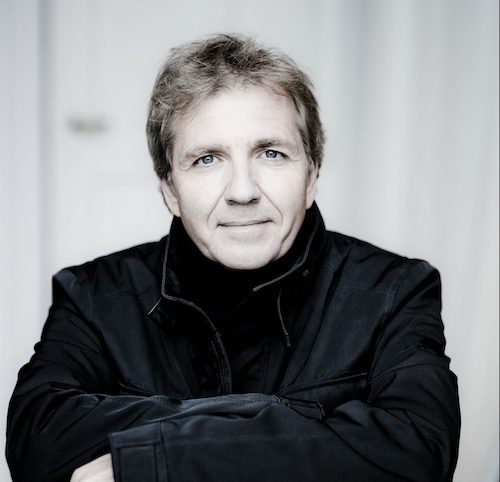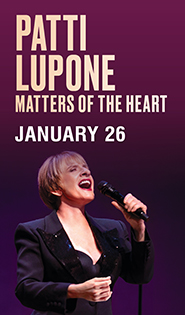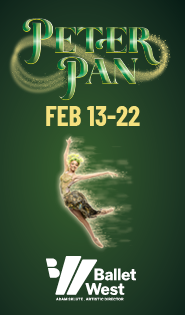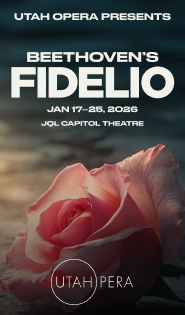Horns to the fore as Fischer opens final season with Utah Symphony

The opener of Thierry Fischer’s final season as music director of the Utah Symphony displayed the Swiss maestro’s flair for eclectic programming as well as the full, expansive sound he has cultivated during his tenure with the orchestra.
The concert also showed the caliber of soloists the conductor routinely brings to the orchestra, with Stefan Dohr, the principal horn of the Berlin Philharmonic, playing Mozart’s Horn Concerto No. 3 and in Schumann’s “Konzertstück in F Major.”
The concert began with two rides: Wagner’s Ride of the Valkyries and John Adams’ Short Ride in a Fast Machine. The juxtaposition of two pieces evoking motion—one written in 1876 and the other in 1986—created an interesting contrast of styles and musical languages. Fischer gave both pieces a textural transparency and rhythmic precision that allowed the listener to hear the way each thematic element fit together. This precision came at the expense of the forward propulsion and drive that makes both pieces so popular, but it seemed a deliberate choice, with Fischer choosing elegance and refinement over bluster and thrills.
Elegance and refinement permeated the Mozart as well. Dohr played with an exquisitely smooth tone and engaging, communicative phrasing, which the orchestra picked up and magnified, creating cathedrals of sound around each of his musical gestures. Dohr captured the humor of the first movement, particularly the cadenza, with its light flourishes punctuated by blaring low notes. His subtle, relaxed phrasing gave the lyrical second movement a contemplative charm, and he lent a playful, carefree energy to the galloping third movement, as he traded phrases with the responsive orchestra. Throughout the piece, Dohr’s personality came through, highlighting both his own musicality and the expressive possibilities of his instrument.
The rarely performed Schumann Konzertstück in F Major for Four Horns and Orchestra further highlighted the horn’s possibilities, this time as part of a quartet. Dohr was joined at the front of the orchestra by Utah Symphony principal Jessica Danz, associate principal Edmund Rollett and fourth horn Stephen Proser. From the piece’s opening passages, they created a lovely blend with clear phrasing and a sense of the piece’s counterpoint. With Dohr taking the lead, the four musicians turned in solid performances, though perhaps due to where they were standing in relation to the orchestra, it was sometimes difficult to hear them over it.
Programming the Schumann alongside pieces by Wagner and Richard Strauss highlighted the contrasting schools of the German Romantic period. Although Schumann predates the schism known as the War of the Romantics, his friend and protégé Brahms represented the traditionalist school while Wagner, and later, Richard Strauss, represented the radical school. Fischer’s restrained, conscientious interpretation of the Schumann starkly contrasted with the unabashed passion he brought to Ein Heldenleben.
The six-section tone poem began with a flourish and showcased the orchestra’s lush yet transparent sound from the outset. Fischer allowed each line of counterpoint to be heard, paying close attention to the outer voices. The rich, consonant, and expansive sound of the Hero’s theme gave way to the second section, “The Hero’s Adversaries,” with a gossipy chromatic passage in the flute joined by counterpoint in the oboe, spreading to the clarinet and answered with menacing line in the low strings. Fischer captured the piece’s contrasting moods with insight and clarity, allowing each instrument to fully state its case.
The third movement, “The Hero’s Companion,” is basically a concerto for violin and orchestra, and concertmaster Madeline Adkins gave a glorious performance, nailing the virtuosic passages with precision and panache and giving the lyrical passages a sweet lilt. Principal oboe Zac Hammond, who joined the orchestra this year, also displayed striking musicality in his solo passages. Beginning with a trumpet fanfare from offstage, Fischer brought a bracing intensity to “The Hero’s Battlefield,” while maintaining the orchestra’s transparency.
Fischer and the orchestra displayed depth and sensitivity through the moody “Hero’s Works of Piece,” as it resolved into the elegic sixth movement “The Hero’s Retreat from the World and Fulfillment,” where Adkins returned as soloist to guide the piece to its triumphant yet relaxed resolution. Fischer and the orchestra seemed genuinely exhausted during the extended standing ovation.
The program will be repeated 7:30 p.m. Saturday. usuo.org


